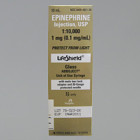
Aug 15, 2014
Is potentially not saving one patient a worthwhile sacrifice if that loss helps pave the way for future saves? Is this ethical? These are two questions that Warwick University in England is having to tackle as they prepare to involuntarily enlist patients in a study to find out how effective epinephrine is in helping achieve ROSC and favorable long term outcomes. While long overdue, a study like this toes a fine line between what is ethical and the opportunity to answer a long debated question of whether or not epinephrine actually makes a difference in cardiac arrest. The results of this study could pave the way for some major changes in cardiac arrest management.
The study will evaluate 8,000 out of hospital cardiac arrests with patient either receiving epinephrine or a placebo with outcomes evaluated after the arrest. The problem with studies on cardiac arrest is there will be a patient population that you just don’t get back and others where we achieve ROSC with very few interventions at all. In other words, sometimes even if you throw everything including the kitchen sink at a patient who arrests right in front of you, you still might not get them back. Still though, if things go as they hope they will, England could see an improvement on their dismal 6% out of hospital ROSC rate.
I am sure that despite overwhelming support from the medical community in England, some will try and poke holes in the ethical aspect of this study. When any medic hears the words “CPR in progress” we immediately shift gears, and many of us will turn up the intensity and focus a notch or two. We know what the task at hand is. This is our bread and butter, it is what we are trained for. It is a true medical emergency. The prospect of possibly not doing everything we can for a patient in cardiac arrest is one that some will struggle with. When looking at the bigger picture though, with the right evidence the results of this study could be earth shaking.
Personally though, I am happy that someone has finally built up enough guts to tackle this one. I am also very pleased to see that Warwick University is doing their best to educate the public by aggressively advertising the change.
The evolution of CPR and cardiac arrest management in my 14 year career as a paramedic has been an interesting one. Just about everything has changed except for the involvement of epi. CPR rates are actually lower than what used to be recommended. Intubation has been deprioritized. The days of “Elephants Like Big Mud Puddles Sometimes” are behind us, and the stack of anti-arrythmics that we used to carry in our bag has been reduced to just a couple in most systems. Even Atropine has been removed from the slow PEA/asystole protocol.
Still though, despite every adjustment, every medication addition and subtraction, “Epi 1:10,000 every 3-5 minutes” has remained a constant. We have, however, reduced the amount of epi that we are giving with the elimination of high dose escalating doses from about ten years ago. Getting rid of that 30 ML vial of epinephrine really freed up a lot of room in the drug bag!
This is going to be a study that I watch very closely, as I am sure my counterpart and vocal critic of epinephrine Mr. Rogue Medic will do as well. While the results are a ways out, Warwick University’s findings could drastically change how we manage our codes.
